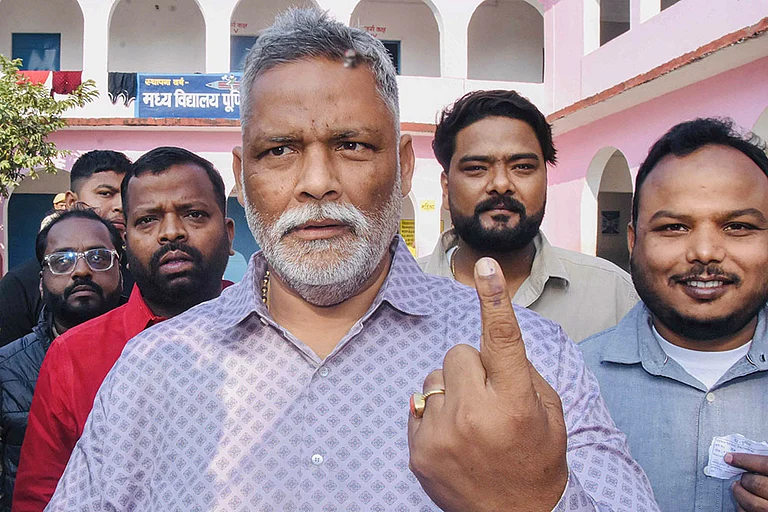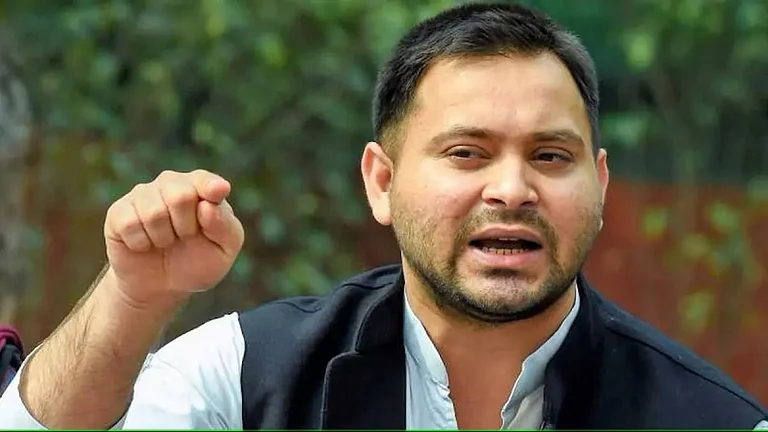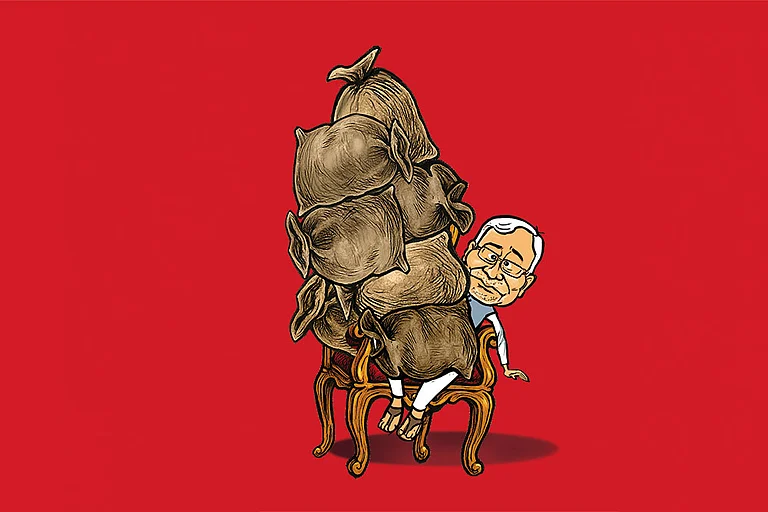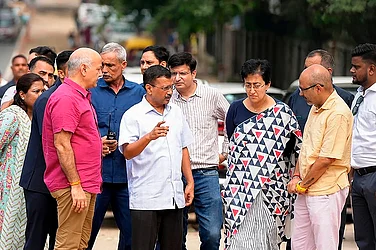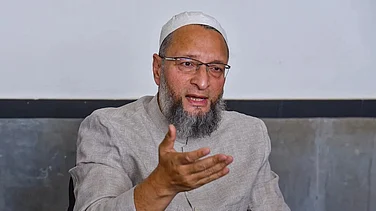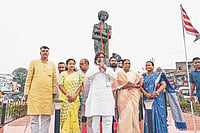
Non-Negotiable Portfolios: Nitish retains core power centres — Home, Education, and influence over the Speaker — ministries he has historically guarded regardless of alliance dynamics.
Political Manoeuvring: By delaying his resignation as caretaker CM, Nitish regained leverage, unsettling BJP expectations despite their superior numbers.
Power Balance Ahead: The BJP may secure the Speaker’s post, but Home is set to stay with Nitish, signalling a government where his authority persists despite a stronger ally.
On November 20, Patna’s Gandhi Maidan witnessed Nitish Kumar taking oath as Chief Minister for the fifth time. Out of Bihar’s 243 Assembly seats, the NDA secured an overwhelming victory with 202 seats.
On Thursday, the mandate was distributed much like before. Nitish Kumar took oath as Chief Minister, while BJP leaders Samrat Choudhary and Vijay Sinha were sworn in as Deputy Chief Ministers, again mirroring the previous arrangement. A total of 26 ministers took oath: 14 from the BJP, 8 from the JDU, 2 from the LJP (Ram Vilas), and 1 each from the parties of Jitan Ram Manjhi and Upendra Kushwaha.
The NDA’s Mandate vs Nitish’s?
What stands out in this mandate is that the BJP, with 89 seats, emerged as the largest party not only within the alliance but in the state as a whole. JDU followed with 85 seats, while the LJP(R) secured 19, and the Manjhi–Kushwaha bloc won five and four seats respectively.
But the real discussion is not about numbers. It is about whether Nitish’s return as Chief Minister will trigger friction over key ministries.
Despite being sworn in for the tenth time, Nitish Kumar has always guarded certain ministries and posts closely. There are a few portfolios he has never parted with, regardless of political circumstances. Even in the previous Assembly, when his party was reduced to just 43 seats, he still held on to the ministry that the BJP is particularly keen on this time.
Let us now look at which ministries and positions these are: the Home Ministry, the Education Ministry, and the post of Speaker.
Key Ministries In Bihar
Since 2005, Nitish Kumar has always retained the Education Ministry whenever he has been in alliance with the BJP. The only exception came in 2015 when he broke away from the NDA and formed a government with the RJD and Congress. During that period, the Education Ministry went to Congress leader Ashok Choudhary, who was considered close to Nitish. Even then, the ministry stayed within his comfort circle, and Choudhary eventually joined the JDU in 2018.
When Nitish returned to the NDA in 2017, Education came back to the JDU. But in 2022, after he again formed the Mahagathbandhan government, he ceded Education to the RJD. By early 2024, when he rejoined the NDA before the Lok Sabha elections, he reclaimed it and placed it under the care of his closest confidant, Vijay Kumar Choudhary.
According to Professor Rakesh Ranjan of Patna University, the reason is ideological rather than administrative. He believes Nitish willingly cedes the Education Ministry to the Mahagathbandhan because their worldview aligns with his socialist approach. But under the BJP, where syllabus revisions and textbook changes are actively pursued, Nitish prefers to retain the ministry to avoid ideological overreach. He also does not want the BJP to use the ministry to consolidate influence within universities and colleges.
The Home Ministry is even more tightly held. Nitish has never let this portfolio go to any party — not the BJP, not the RJD, and not even senior leaders within the JDU. Even in 2020, when his party was severely weakened, he refused to part with the Home portfolio. He was willing to give up the Speaker’s post then, but not the Home post.
The Home Department is crucial; it controls policing, intelligence, prisons, fire services, anti-Naxal operations, election security, and coordination with district magistrates. It also manages transfers, postings, and key administrative decisions. Nitish believes that maintaining strict personal oversight ensures stability and prevents any law-and-order mishaps from spiralling politically. As senior journalist Pushyamitra notes, Nitish sees the Home Ministry as non-negotiable. He may give up the Speaker’s post, but he will not surrender Home.
This caution comes from past incidents, including the Bihar Sharif violence last year, where administrative lapses by a single officer escalated tensions. Nitish does not want to take on any such risk, especially given the volatile political climate.
The Speaker’s post is the third crucial position. It has always been strategically important for Nitish, because the Speaker has decisive power under the anti-defection law — crucial during floor tests, rebel activity, or alliance switches. When the Speaker belongs to Nitish’s camp, he gains control over the Assembly’s flow, scheduling, categorising bills, taking action against defectors, and managing disruptions. However, whenever Nitish’s numbers have weakened, this post has slipped out of his hands. In 2020, with just 43 seats, he had to concede the Speaker’s role to the BJP’s Vijay Kumar Sinha. In 2022, when he went back to the Mahagathbandhan, the Speaker’s post went to the RJD. When he returned again to the NDA in early 2024, he had to accept another BJP Speaker, Nand Kishore Yadav. In short, the Speaker’s post has been Nitish’s most important shield in the Assembly — but it is also the one he is most likely to compromise on when his numbers weaken. Nitish’s strategic timing and political manoeuvring Despite the BJP being the largest party this time, Nitish has once again managed to unsettle them with strategic timing and political manoeuvring. Many believed he would be reduced to a symbolic figurehead in this NDA government, with the BJP holding operational control. But Nitish reversed the script. On November 17, it was widely expected that after the Cabinet meeting, Nitish would recommend dissolving the Assembly and resign as caretaker Chief Minister. But he did not. He knew that as a caretaker CM, he would lose leverage. By delaying this move, he ensured he could negotiate ministerial allocations, particularly Home and Speaker, from a position of strength. With this calculation, he protected his control over Home and prolonged negotiations over the Speaker’s post. Interestingly, until recently, the narrative around Nitish was dominated by concerns over his health. Now, the conversation has shifted back to his political acuity.
As for whether he will replicate his 2010-style dominance over ministries, the picture remains fluid. According to Professor Rakesh Ranjan, it is unlikely Nitish will retain both Home and Education, along with securing the Speaker’s post. He believes this government is, in some ways, a compromise for Nitish. The BJP gaining two Deputy CMs despite Nitish being only four seats behind them reflects this. Whether Nitish gives up the Speaker or makes any concession on Home will determine the final balance of power.
Sources suggest the Speaker’s post may eventually go to the BJP, with Home remaining firmly with Nitish. The name of eight-time MLA Prem Kumar from Gaya is reportedly under consideration for the post of Speaker.
Nitish’s 2025 Mandate
The 2025 mandate has once again placed Nitish Kumar at the centre of Bihar’s political structure, but it has also narrowed the space in which he can manoeuvre. His retention of crucial ministries signals that he will not allow the BJP to dominate the government despite its numerical strength. Yet, the balance is delicate; Nitish must protect his authority while managing an ambitious ally and a fragmented opposition. As negotiations conclude, the contours of power-sharing will reveal whether Nitish still holds the same space he once commanded, or whether this term marks the beginning of a more constrained phase in his long political journey.








